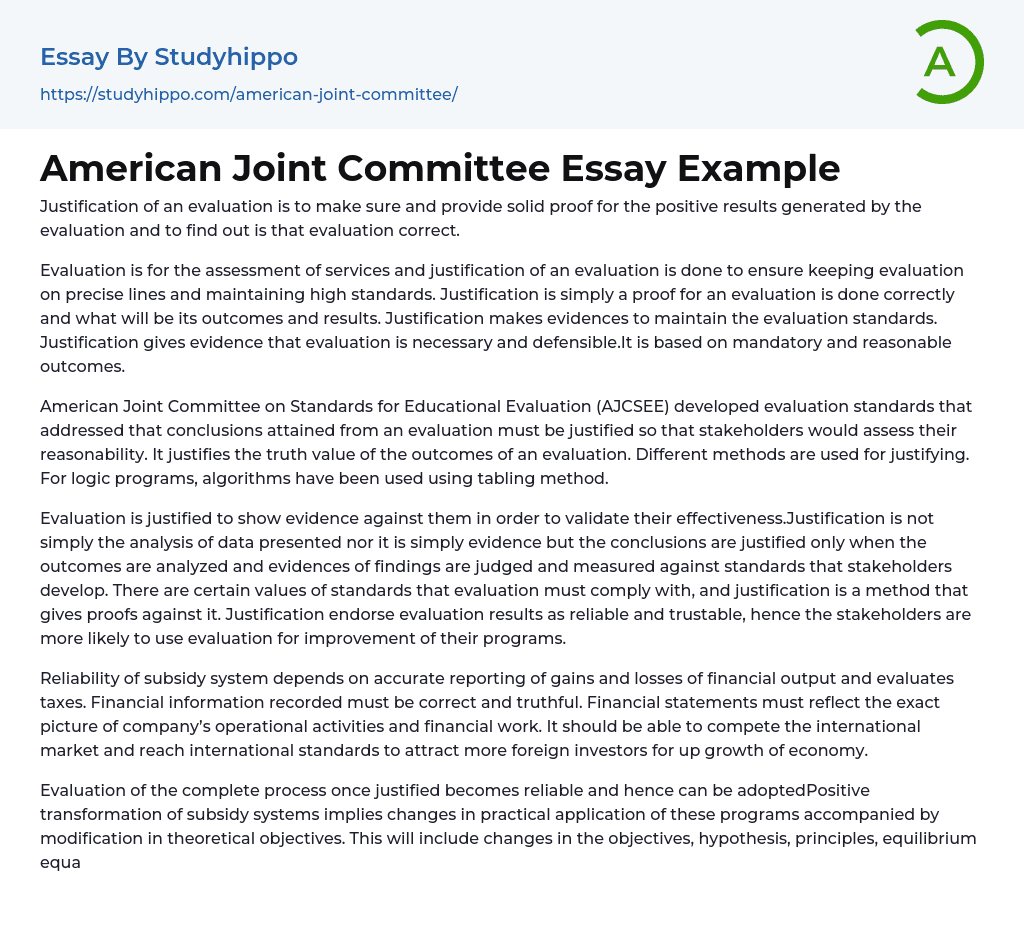The purpose of justifying an evaluation is twofold: to provide concrete evidence for positive outcomes and to ascertain the accuracy of the evaluation.
The purpose of evaluation is to assess services and ensure high standards are maintained. Justifying an evaluation involves proving that it has been performed correctly and predicting its results and outcomes. By providing evidence to support evaluation standards, justification helps establish and defend the need for evaluation. This evidence is grounded in mandatory and reasonable outcomes.
The American Joint Committee on Standards for Educational Evaluation (AJCSEE) created evaluation standards which emphasized the importance of justifying the conclusions made through an evaluation. This is necessary in order for stakeholders to assess the reasonability of the outcomes. There are various methods used to justify these conclusions, including the use of algorithms with a tabling method for logic programs.
...
Evaluation is necessary to demonstrate proof against programs in order to confirm their efficacy. Simply analyzing presented data or providing evidence is not enough for justification; only when outcomes are analyzed and evidence is evaluated against stakeholder-developed standards can conclusions be justified. Evaluation must comply with established standards, and justification provides evidence against these standards. By endorsing evaluation results as dependable and trustworthy, justification supports stakeholder use of evaluation for program improvement.
For the subsidy system to be dependable, it is crucial to have precise reporting on financial output gains and losses, as well as accurate evaluations of taxes. The recorded financial information should be truthful and correct, and financial statements must portray the exact picture of the company's operational activities and financial work. Additionally, the company must be able to compete in the international market
and meet international standards to attract more foreign investors and promote the growth of the economy.
Evaluating the complete process is reliable when justified, making it adoptable. Positive transformation of subsidy systems requires changes in practical application and theoretical objectives. This includes modifying objectives, hypotheses, principles, equilibrium equations, components, computations, assets, and calculations. If financial statements are accurately recorded and carefully made, they can aid in evaluating managers' performance. The transformation of the economy from state control to international economic standards can eliminate significant problems in subsidized systems and foreign investment. Justification confirms that the evaluation process is heading in the right direction.
OOP provides a means of justification as it involves grouping individual objects in computer programs instead of conventional instructions. These objects are interconnected, receive and transmit messages, and process data, making it a dependable and practical programming approach. Consequently, software engineering extensively utilizes OOP.
Learning OOP is simpler and more manageable and also aids in the development and maintenance of software. This approach involves analyzing, coding, and simplifying complex processes. The object-oriented model is established through several associated models, such as diagrams, Class Responsibility Collaborator (CRC), documentation, and prototypes that can be used to give a complete or partial representation. The Unified Modeling Language (UML) is industry-standard and enables the specification, visualization, construction, and documentation of software artifacts.
Several industries have incorporated OOP-based applications, incorporating classes, methods, and inheritance. CASE tools support object-oriented modeling notations and methods, and newer versions also support Java language. These tools can also facilitate logical and physical database modeling using relational databases.
When evaluation results are justified and meet standards, they are more likely to be used for program improvement in
both long-term and short-term conditions. According to the Economist, it is common for companies to suffer from losses due to numerous small mistakes, such as Carrefour opening outlets in unsuitable locations for their business. Assessing expenditures, costs, and income generated are crucial factors in any business operation that is regularly evaluated to increase gross profits and enhance business prospects.
The business's progress is estimated by comparing overall sales for the month with previous sales volume, lost orders, expenditures, employee salaries, and hours charged. The goal is to promote cost-effective business practices to increase profitability for every investment. The online retail store is currently showing profit with the gradual improvement of the economy, but there is still room for productivity enhancement and loss reduction. To improve the net profit gained, it is essential to expand sales income while limiting direct cost expenditure in light of the current economic situation. Updating knowledge of the market, competitors, and the product is crucial.
Having top-notch service, delivering on time, and keeping promises are crucial aspects. To achieve this, it is necessary to justify the evaluation outcomes. References can help in justifying the conclusions. Visit https://www.cdc.gov/ for more information.
- Auction essays
- Balanced Scorecard essays
- Business Plans essays
- Expense essays
- Income essays
- Net Income essays
- Security Guard essays
- Singapore Airlines essays
- Battle essays
- Intranet essays
- Maintenance essays
- Simulation essays
- Inn essays
- Chief Executive Officer essays
- Convenience Store essays
- Firm essays
- Training And Development essays
- Unilever essays
- Variable Cost essays
- Virgin Group essays
- Bargaining essays
- Entity essays
- Pest analysis essays
- Programming Languages essays
- Object-Oriented Programming essays
- Java essays
- Leadership and Management essays
- Change Management essays
- Project Management essays
- Knowledge Management essays
- Operations Management essays
- Quality Management essays
- Risk Management essays
- Scientific Management essays
- supply chain management essays
- Performance Management essays
- Time Management essays
- Brand Management essays
- Total Quality Management essays
- Risk essays
- Manager essays
- Leadership essays
- Business Ethics essays
- Board Of Directors essays
- Product Management essays
- Comparative Analysis essays
- Decision Making essays
- Dispute Resolution essays
- Stress Management essays
- Business Management essays




